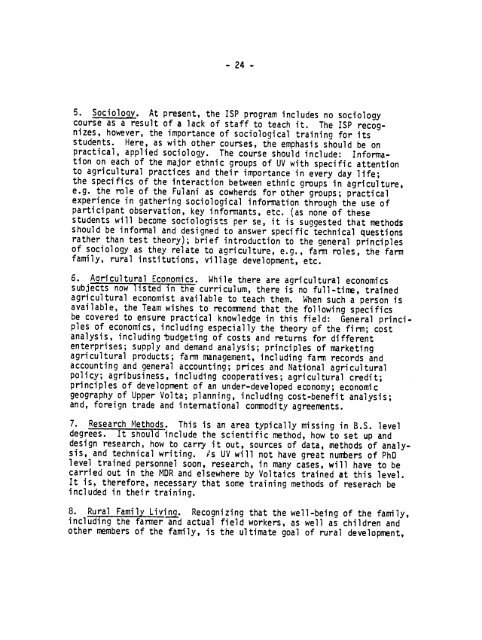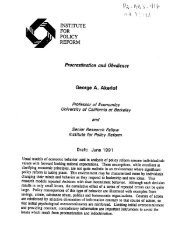Bi.,5 - (PDF, 101 mb) - USAID
Bi.,5 - (PDF, 101 mb) - USAID
Bi.,5 - (PDF, 101 mb) - USAID
- TAGS
- usaid
- pdf.usaid.gov
Create successful ePaper yourself
Turn your PDF publications into a flip-book with our unique Google optimized e-Paper software.
- 24 <br />
5. Sociology. At present, the ISP program includes no sociology<br />
course as a result of a lack of staff to teach it. The ISP recognizes,<br />
however, the importance of sociological training for its<br />
students. Here, as with other courses, the emphasis should be on<br />
practical, applied sociology. The course should include: Information<br />
on each of the major ethnic groups of UV with specific attention<br />
to agricultural practices and their importance in every day life;<br />
the specifics of the interaction between ethnic groups in agriculture,<br />
e.g. the role of the Fulani as cowherds for other groups; practical<br />
experience in gathering sociological information through the use of<br />
participant observation, key informants, etc. (as none of these<br />
students will become sociologists per se, it is suggested that methods<br />
should be informal and designed to answer specific technical questions<br />
rather than test theory); brief introduction to the general principles<br />
of sociology as they relate to agriculture, e.g., farm roles, the farm<br />
family, rural institutions, village development, etc.<br />
6. Agricultural Economics. While there are agricultural economics<br />
subjects now listed in the curriculum, there is no full-time, trained<br />
agricultural economist available to teach them. When such a person is<br />
available, the Team wishes to recommend that the following specifics<br />
be covered to ensure practical knowledge in this field: General principles<br />
of economics, including especially the theory of the firm; cost<br />
analysis, including tudgeting of costs and returns for different<br />
enterprises; supply and demand analysis; principles of marketing<br />
agricultural products; farm management, including farm records and<br />
accounting and general accounting; prices and National agricultural<br />
policy; agribusiness, including cooperatives; agricultural credit;<br />
principles of development of an under-developed economy; economic<br />
geography of Upper Volta; planning, including cost-benefit analysis;<br />
and, foreign trade and international commodity agreements.<br />
7. Research Methods. This is an area typically missing in B.S. level<br />
degrees. It should include the scientific method, how to set up and<br />
design research, how to carry it out, sources of data, methods of analysis,<br />
and technical writing. 'sUV will not have great nu<strong>mb</strong>ers of PhD<br />
level trained personnel soon, research, in many cases, will have to be<br />
carried out in the MDR and elsewhere by Voltaics trained at this level.<br />
It is,therefore, necessary that some training methods of reserach be<br />
included in their training.<br />
8. Rural Family Living. Recognizing that the well-being of the family,<br />
including the farmer and actual field workers, as well as children and<br />
other me<strong>mb</strong>ers of the family, is the ultimate goal of rural development,

















